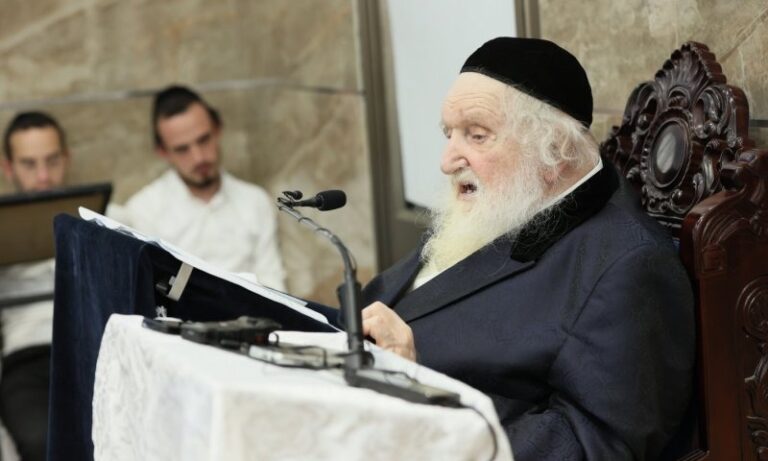
[Halachically Speaking appears on YWN weekly, Tuesdays and Thursdays]
Written by Rabbi Moishe Dovid Lebovits of KOF-K Kosher Supervisio
Preparing for a Trip
The Mishnah Berurah[1] (and others) says one should take along his tallis and tefillin when traveling. When traveling by airplane, one’s tallis and tefillin should not be placed together with the baggage that goes underneath the airplane.[2] Some say that one should say the parshas akeida before going on a trip.[3] One should learn Torah before[4] and during the trip.[5]
It is a nice practice for one to give tzedakah before going on a trip.[6] Some say before going on a trip, one should be made a shliach by someone else to give money to tzedakah at his destination. In this way he will not be in danger on the way, since he is a shliach mitzvah.[7]
In the writings of Horav Yehuda Hachassid[8] it states if one went on the road and forgot something in his house,[9] he should not go back to retrieve it. Instead, he should ask someone in the house to get it for him.[10] Some say the reason for this concern is because when one goes on the derech theshechinah is with him and if he goes back to retrieve an object it is disrespectful to the shechinah.[11] However, if it is an object used for a mitzvah, he may go back to get it.[12] If one did not actually leave the house yet, he may go back to get an object.[13]
There is an opinion in the poskim that if one has more than one entrance to his house there is no concern with going into the second door to retrieve an object that was forgotten.[14] If one is only going to a nearby place there is no concern with going back to retrieve an object that was forgotten.[15] There is a discussion in the poskim whether this inyun is applicable to one who travels by an airplane, etc.[16]
The Bathroom on an Airplane
Many poskim say that the bathroom on an airplane does not have the same status as a regular bathroom in a house or office. Therefore, one may wash his hands for a meal there.[17] Similarly, one who went into the bathroom to get something (and did not use the facilities) would not be required to wash his hands upon exiting the bathroom.[18] When awaking from sleep one must be careful not to delay to use the bathroom, and should go as soon as possible to avoid the issur of bal tishaktzu.[19]
Touching Food before Washing Hands
After one wakes up from sleep on an airplane, it is common not to wash his hands right away since there might be a long line for the bathroom, etc. One must be careful not to touch any food before washing his hands.[20] If he did touch food, then if the food can be washed off, then it should be washed three times,[21] otherwise according to many poskim the food is permitted to be eaten b’dieved.[22] Many poskim say when it comes to a goy, one does not have to worry about eating such food because most people wash their hands in the morning etc. even though it might not be with a utensil etc.[23]Additionally, some say there is no ruach rah by a goy.[24] Therefore, if a goy hands out food that he touched, one may eat the food.
Sleeping While Wearing a Tallis Katton
When sleeping on an airplane, one normally does not remove his tallis katton first. Therefore, when he wakes up no beracha is recited on the tallis katton. One who wears a tallis gadol recites the regular beracha on the tallis gadol thereby exempting the tallis katton.[25]
The Beracha of Roka Hu’aretz Al Hamayim
The beracha of Roka Hu’aretz Al Hamayim was instituted when one steps on the ground upon awakening.[26] The beracha of Roka Hu’aretz Al Hamayim may be recited when one wakes up even if he is not stepping on the ground but only on the floor of the airplane.[27]
Davening While Dressed Properly
The Gemorah in Shabbos[28] states that different chachumim performed certain activities as a preparation for davening. The Gemorah says that this was done based on the posuk “one should prepare before calling to your G-d.”[29] Many preparations must be conducted before one can daven properly. If one has a special meeting with the president, he would be careful to make sure he was properly prepared for the meeting. How much more so, must one be careful to dress properly before davening. Additionally, tefilla is in place of korbonos, and just as the kohanim wore nice clothing while doing theavodah, we too must wear nice clothing while davening.[30] Many times one davens on an airplane after having just woke up from a long sleep. One must be careful to tuck his shirt in and wash up before davening to Hashem. Davening with one’s shirt tucked out of his pants or while half asleep is not acceptable.
Davening on an Airplane
On an airplane, the minyanim are often made in the back of the plane. The question arises whether or not one is allowed to daven there, since it is usually opposite the bathroom. This is also a very common issue when saying asher yotzar after using the bathroom. Many poskim maintain that it is permitted todaven opposite the bathroom.[31] Some say that one should not daven in the back of the plane since it causes a chillul Hashem when it is very crowded and people cannot get to the bathroom.[32] It is said over in the name of Horav Shimon Schwab zt”l that he never davened in the back of the airplane and considered davening there a chillul Hashem.
Although one normally needs to daven with a mechitzah between him and women,[33] when one is davening on a airplane no mechitza is required. The reason is because it is not a permanent place for tefilla.[34]
Many poskim say that tachnun may only be recited if one is in a place that has a sefer Torah.[35] Accordingly, on an airplane tachnun is recited, but without placing one’s head on his arm. Many Chassidim do not recite tachnun when traveling.[36]
Distributing Presents before Davening
Before davening, one should not distribute presents which he brought home from a trip.[37] However, if the children are begging you for the gifts, one may give them the presents before he davens.[38]
Reciting Tefillas Haderech
The Obligation
The Gemorah in Berochos[39] says when a person goes “on the way” he needs to say tefillas haderech.[40] One should not be lenient with this requirment.[41] The Levushei Mordechai[42] says women are also obligated in this tefilla.[43] The obligation of tefillas haderech does not only apply when traveling by foot, but also when traveling by car, boat,[44] train and airplane.[45] The poskim say one who is traveling for a devar mitzvah has to say tefillas haderech.[46] The tefilla should be recited in loshon rabim since one’s tefillas will then have a better chance of being answered.[47] If the tefillawas said in loshon yuchid it does not have to be repeated. [48] Some say that one should also say Yoshev Beseiser, and Shir Hamalos Eisa Eiyni.[49] Saying these added tefillos are a segula for a safe trip
Saying the Tefilla
There is a dispute among the poskim if one person can say the tefilla and exempt others.[50] It is preferable for each one to say the tefilla for themselves.[51] If this is not possible (no siddurim), one person can say it for everyone.[52] Horav Yaakov Kamenetsky zt”l maintained since tefillas haderech is atefilla not a beracha, if one is in doubt whether or not to say it, one should say the tefilla.[53]
Sitting vs. Standing
It is preferable to say tefillas haderech while standing.[54] When traveling by car it is better to stop the car and say the tefilla.[55] If this is not possible, one may say it while driving.[56] When traveling by boat or train, where it is possible to stand when saying the tefilla, this is what should be done (based on the Aruch Ha’shulchan).[57] Although on a plane it is possible to stand while saying tefillas haderech, since it is difficult to concentrate while standing on an airplane, one should recite it while sitting.[58]
Saying it next to another Beracha
The Maharam M’Ruttenberg said initially one should say a different beracha before saying tefillas haderech because tefillas haderech does not begin with a beracha.[59] A beracha achrona on food or an asher yotzar should be said, followed by tefillas haderech.[60] The poskim mention that aberacha on smell may not be said before tefillas haderech.[61] Horav Yisroel Belsky Shlita holds if one cannot make either a beracha achrona or an asher yotzar, then one may make a beracha rishona on food, eat the food and then say tefillas haderech.[62] If one did not say a beracha prior to recitingtefillas haderech, he may say it anyway.[63] Horav Yisroel Belsky Shlita holds if one is being yotzei someone else in the tefilla, then he may also be motzei him the inyun of making a beracha before tefillas haderech (either on food or an asher yotzar etc).
On an Airplane
When on an airplane, tefillas haderech is said when the plane is high enough that if it would fall there would be danger.[64] Horav Yaakov Kamenetsky zt”l says when traveling by plane the tefilla should be said at the time the plane is still on the ground and starts to go fast in preparation for take off.[65]Horav Elyashiv Shlita holds if one did not say tefillas haderech before the plane took off he may say it when the plane is in the air.[66] The poskim state if tefillas haderech is said on the way to the airport then one is exempt from saying it on the plane.[67]
Using a Disposable cup for Netiylas Yudayim
On an airplane it is very common that there is no metal or hard plastic cup to wash one’s hands, and all that is available is a paper or plastic cup. Although there is a discussion in the poskim if one may use a plastic or paper cup to wash his hands.[68] If no other cup is available, one may use either a paper or plastic cup to wash his hands.[69] Care should be taken that one dries his hands outside the bathroom.[70]
Drying Hands on Clothing
Many times when traveling there are no tissues available for one to dry his hands after washing. One must be careful not to dry his hands on his clothing because doing so causes forgetfulness of one’s Torah knowledge.[71] One should not dry his hands on any garment.[72] One may dry his hands on a garment that is drying on the line outside, etc.[73] Drying your hands on your friends garment is not permitted (see footnote).[74] Many people before washing their hands for bread dry off any water that might be on them. Some poskim say that one may dry his hands on his clothing in this situation.[75]
“The Mezonos Roll”
When one is on an airplane many times mezonos rolls are served with the meal. As will be explained below, these rolls are not mezonos.
The Shulchan Aruch[76] says, based on the opinion of the Rambam,[77] if one kneads dough with honey, milk or fruit juice, and the fruit juice is recognizable in the bread, the beracha on the bread is mezonos. The Rama[78] disagrees, and says this is still called bread and the beracha is hamotzei unless there is a lot of fruit juice or spices, then the beracha is mezonos. The Mishnah Berurah,[79] as well as many other poskim, maintain that the fruit juice, etc has to be most of the mixture, and one has to taste it in the bread in order for the beracha to be a mezonos.[80] Others say that it does not have to be most of the mixture, but it needs to be a lot.[81]
There is an opinion (that of the Da’as Torah)[82] who maintains if a mixture has mostly fruit juice then one does not need to taste it in the mixture. However, all other poskim disagree and one should not rely on this.[83] Furthermore, the Da’as Torah is only going according to the opinion of the Shulchan Aruch and not the Rama.[84] Moreover the Da’as Torah explicitly states that his chiddush applies only to a specific group of juice none of which is currently used in baking. Thus one who claims the Da’as Torah as the source for his leniency in mezonos bread is actually following only one part of that opinion while arbitrarily rejecting the other. That is an amazing feat more probably the province of jugglers and circus performers than Rabbonim.[85]
Some claim that some of the aforementioned reasoning can be extended to mezonos rolls causing their beracha to be a mezonos.[86] As we have demonstrated before the reasoning is fallacious and because of this thousands of people on a daily basis are not washing for bread and bentching like they are supposed to.[87] The taste of the items with fruit juice is not significantly different than that of regular bread. People eat the roll in order to have the same experience as eating regular bread. It is strange to say that it can be called cake. People avoid washing when they eat this mezonos bread, and this is wrong even if it were really mezonos bread al pi din[88] since they are kovea seuda on it[89]. Even Sefardim who go with the opinion of the mechaber[90] would wash in this situation since one cannot tell the difference between this bread and other breads.[91]
Additionally, most apple juice is from concentrate and this does not have the status as complete fruit juice.[92] Many bakeries use apple juice from concentrate, and it would come out that the rolls are made with mostly water, and one would wash according to everyone.[93]
In conclusion, the practice to give out mezonos rolls on airplanes and by simchas is misleading and improper.[94] “Mezonos rolls” are an oxymoron, since mezonos and rolls cannot co-exist.[95]
Fortunate are those hechsherim which do not allow bakeries to make mezonos rolls. Many people think that a mezonos roll is a loophole in washing ones hands and bentching. However, in reality it is not and one must wash and bentch.[96] Many poskim say that these rolls should only be eaten during a meal where one washes on bread.[97]
[1] 110:20, Aruch Ha’shulchan 110:5, Nekius V’kovod B’tefilla page 207:225, Rivevos Ephraim 5:page 225, 7:56:4, 8:481:20.
[2] V’ihiy B’nsoa page 3. One should not place the bag containing his tefillin under the footrest (Toras Haderech 6:22). Seforim may be packed in a suitcase, but one should not place them in a suitcase with clothing that needs to be laundered (V’ihiy B’nsoa page 2:footnote 6). If one has a flight on Motzei Shabbos he should not prepare his ticket onShabbos (Tzitz Eliezer 14:37:2, Rivevos Ephraim 5:286). One should not place a sefer in the pocket in front of one’s seat on an airplane if it is together with non-kosher magazines (Toras Haderech 6:33:footnote 61).
[3] Lekutei Maharich 1:page 108b (old). Some have the custom to recite the Parshas Haketores from a klaf before leaving on a trip (Toras Haderech page 66:footnote 12).
[4] Elya Rabbah 110:8, Aruch Ha’shulchan 15, Kaf Ha’chaim 24.
[5] Shulchan Aruch Harav 9, Mishnah Berurah 20, Aruch Ha’shulchan 10, Kaf Ha’chaim 40.
[6] Sefer Chassidim 1056:page 209, Kaf Ha’chaim 24.
[7] Kaf Ha’chaim 110:27, Ohelecha B’amiseicha 6:13.
[8] Will Number 38, see Kaf Ha’chaim Y.D. 116:162, Lekutei Maharich 1:page 218 (new print), Ohelecha B’amiseicha 4:footnote 89. It seems if two people are leaving and one forgot something it is permitted for the other one to get the object that he forgot (Ohelecha B’amiseicha ibid). Refer to Lekutei Maharich ibid who brings a proof that this inyunis not a concern and one may return to get an object that was forgotten. However, refer to Toras Haderech page 311 who argues with the proof.
[9] Some say if one left something in a hotel room then one can return to get it without any problem. However, one should not rely on this (Lekutei Maharich 1:page 218 new print).
[10] Ohelecha B’amiseicha 4:55.
[11] Refer to Toras Haderech pages 291,559-560.
[12] Ohelecha B’amiseicha 4:56.
[13] Darchei Teshuva 116:64. It is questionable if one can go back to his house once he left to return an object that he does not need on the trip (Ohelecha B’amiseicha 4:59).
[14] Refer to V’lechticha B’deredch 1:footnote 5.
[15] Kaf Ha’chaim O.C. 110:24, Y.D. 116:162.
[16] Refer to Shemiras Haguf V’hanefesh 99:7.
[17] Refer to Maharam Brisk 1:117, Eretz Tzvi 1:110-111, Masef Lechul Hamachanus 4:96, Chelkes Yaakov 1:205, see 2:174, Minchas Yitzchok 1:60, 4:36, Darchei Chaim V’sholom 91;page 35, Be’er Mordechai 1:1, Be’er Moshe kuntres electric 7:114:8, Rivevos Ephraim 2:6, Halichos Shlomo Tefilla 20:24, Ohr L’tzyion 2:1:10, Sheiros Yosef 1:4:20,Minchas Gidiyon 2:9:page 175:footnote 22, V’ihiy B’nsoa 1:10:page 6:footnote 17, V’yan Yosef 1:2, Sharei Ha’beracha 1:foootntoe 112. The V’lechticha B’derech 8:2:footnote 68 says one should cover the seat before hand. Some say the bathroom on an airplane has the same dinim as the bathroom in one’s house.
[18] Ohr L’tzyion 2:1:10, see Nekius V’kovod B’tefilla page 14:14.
[19] Refer to Shulchan Aruch 92:1, Mishnah Berurah 1-7,10, Eishel Avraham Butchatch 3:13, see Orchos Rabbeinu 1:page 14:9, Nekius V’kovod B’tefilla page 159:5, also see ibid:page 40:24. One should not bring any food into the bathroom on an airplane (Rivevos V’yovolos 2:12).
[20] Shulchan Aruch Harav 4:2, Chai Adom 2:2, Chesed L’alafim 4:2, Kaf Ha’chaim Palagi 8:16, Mishnah Berurah 4:14, Kaf Ha’chaim 4:20, Masef Lechul Hamachanus 4:32, Yabea Omer 4:1, Rivevos Ephraim 2:6, 4:6, 7:1, Kovetz Halachos for the Summer page 62:footnote 12.
[21] Mishnah Berurah 4:10, Kaf Ha’chaim 4:20, Masef Lechul Hamachanus 4:38, Ohr L’tzyion 2:1:4, Yabea Omer 4:1:12.
[22] Chai Adom 2:2, Mishnah Berurah 4:14, Aruch Ha’shulchlan 15, Yabea Omer 4:1, Ohr L’tzyion ibid, Shemiras Haguf V’hanefesh 54:15. See Minchas Gidiyon page 111 who quotes poskim who are stringent. Refer to Shraga Hameir 7:171:1who says it is not bal tashchis if one wants to throw out the food that was touched by someone who did not wash his hands, see Teshuvos V’hanhugos 1:1, 2:3, Shevet Ha’kehusi 1:3-4.
[23] Teshuvos V’hanhugos 1:1, Yabea Omer 4:1:9-10, E’ven Yisroel 7:1, Tzitz Eliezer 13:2, Ohr L’tzyion 2:1:4, Orchos Rabbeinu 3:pages 185-186:7, Shila D’kaita pages 121-122. Refer to Shevet Ha’kehusi 1:4 who is stringent
[24] Refer to Pri Megadim M.Z. 4:7, Shulchan Aruch Harav 4:2, Mishnah Berurah 4:10, Yabea Omer 4:1, see Shemiras Haguf V’hanefesh 54:16.
[25] Refer to Shulchan Hatohar 21 Zer Zav:9:page 22. See Mishnah Berurah 8:42, Ohelecha B’amiseicha 10:8.
[26] Shulchan Aruch 46:1.
[27] Be’er Moshe kuntres electric 7:91, Rivevos Ephraim 3:47:3, Kochvei Yitzchok 1:20:3, Toras Haderech 10:61.
[28] 10a, see Rashi Berochos 25a “avol,” Rambam Hilchos Tefilla 5:5, Bal Haturim Bereishis 25:1-2, Shulchan Aruch 91:2,5. Refer to Pela Yoetz “levisha” page 365.
[29] Amos 4:12.
[30] Based on Shulchan Aruch 98:4. One who is wearing a camera case on his neck should remove it before he davens (Shila D’kaita page 11:15).
[31] Refer to Bais Yosef 83, Shulchan Aruch 1, Magen Avraham 83:1, Chai Adom 3:11, Mishnah Berurah 1-5, Aruch Ha’shulchan 83:5, Shulchan Hatohar 83:1, Igros Moshe E.H. 1:114, Halichos Shlomo Tefilla 20:footnote 38, Kovetz Bais Aaron V’Yisroel 102:pages 90-91, Ohr L’tzyion 1:1, Ishei Yisroel 53:4 :footnote 6 (old), Chut Shuni Niddah page 200:footnote 6. Some say it is permitted even if the door is opened but no foul smell is emanating from the bathroom (Igros Moshe ibid, Vezos Ha’beracha page 151). Others say to close the door (Oz Nedberu 5:28:1, Vezos Ha’beracha page 151 quoting the opinion of Horav Elyashiv Shlita ). See Taz 1, Kaf Ha’chaim 4, Shevet Ha’Levi 4:10.
[32] Halichos Shlomo Tefilla 8:footnote 12, V’hiy B’nsoa page 31:footnote 79 quoting the opinion of Horav Wosner Shlita, Shila D’kaita page 288:28. As far as davening while sitting refer to Shulchan Aruch 94:4,9, Mishnah Berurah 25-27, Aruch Ha’shulchan 94:16,20, Igros Moshe O.C. 4:20, Be’er Moshe 3:14, Rivevos Ephraim 1:50:12, 2:48:98, 196, 199, 4:44:96, Emes L’Yaakov 94:footnote 121, Yisroel B’mamadam 1:9:21, V’ihiy B’nsoa page 29:10, Ohelecha B’amiseicha 10:49. Even when one sits for Shemonei Esrei he feet should be placed together as is done normally (Be’er Heitiv 95:3, Chesed L’alafim 91:2, Mishnah Berurah 2, Shoneh Halachos 95:2).
[33] Refer to Mesechtas Succah 51b. This topic will be discussed in detail I’YH in Halachically Speaking Volume 2 Issue 29.
[34] Halichos Shlomo Tefilla 8:footnote 4. If one is sitting in front of a woman who is not properly dressed or he is in front of a video screen with improperly clad woman on the screen he should close his eyes if he wants to daven (Refer to V’ihiy B’nsoa page 24, Ishei Yisroel 50:9 (old), Bais Boruch miluyim 4:page 416, Oz Nedberu 12:27:2). Some say it is better for one to sit at a window seat this way he will not have to look at the video screen or any improperly clad woman (Toras Haderech 6:18).
[35] Bais Yosef, Darchei Moshe 3, Rama 131:2, Shulchan Aruch Harav 3, Aruch Ha’shulchan 10, Shulchan Hatohar (Karmarna) 131:8, Shulchan Shlomo 131:2.
[36] Shulchan Hatohar 131:23, Otzer Ha’chaim pages 70-71, Ohelecha B’amisecha page 119:69, Minhag Yisroel Torah 131:page 228, Avodas Ephraim 1:pages 328-330.
[37] Magen Avraham 554:21 says this is included in sheilas shalom, see Kaf Ha’chaim 20, Betzel Hachuchma 5:73, Rivevos Ephraim 3:2.
[38] Betzel Hachuchma ibid.
[39] 29b.
[40] Refer to Tur, Shulchan Aruch 110:4, Levush 4, Shulchan Aruch Harav 6, Aruch Ha’shulchan 110:9. Horav Shlomo Zalman Aurbach zt”l maintains that the tefilla was instituted to avoid armed robbers and wild animals on the derech, and not to avoid car accidents. (Ishei Yisroel 50:footnote 24 old). If one is driving on dangerous roads in the city one does not recite tefillas haderech (Opinion of Horav Moshe Feinstein zt”l quoted in Darchei Ori page 275).
[41] Refer to Da’as Zekanim Bamidbar 6:35, Shulchan Shlomo 110:2, Lekutei Maharich 1:page 216 (new), Nemukei Orach Chaim 110:4, Be’er Moshe kuntres electric 7:83:3, Teshuvos V’hanhugos 1:199. Going on the same route everyday does not exempt one form saying tefillas haderech every day (Emes L’Yaakov page 65:footnote 138).
[42] Y.D. 35.
[43] Halichos Beisa 10:10:footnote 18.
[44] Kaf Ha’chaim 14, see Bais Avi 4:18:1. If one goes on a cruise and there are stop overs then one should recite tefillas haderech the first day and each additional day without the shem or malchus. (Sharei Teshuva 11:8, Ishei Yisroel 50:footnote 13). If one does not stop then he should recite it daily in shomea tefilla (Halichos Shlomo Tefilla 21:2). Refer to Mishmeres Shalom 16:1.
[45] Refer to Mishnah Berurah 110:30, Aruch Ha’shulchan 11, Kaf Ha’chaim 110:14, Nemukei O.C. 110:4, Ohelecha B’amiseicha 9:4:footnote 6, Ishei Yisroel 50:2:footnote 5 (old), Kochvei Yizchok 1:20:3. One is permitted to ride on a airplane for leisure and it is not considered putting oneself in danger (Be’er Moshe kuntres electric 7:83:1, Kochvei Yitzchok 1:20:1).
[46] Refer to Ohelecha B’amiseicha 9:6.
[47] Shulchan Aruch 110:4, Levush 4, Magen Avraham 10, Machtzis Ha’shekel 10, Taz 3, Be’er Heitiv 10, Mishnah Berurah 19, Aruch Ha’shulchan 10, see Ohelecha B’amiseicha 9:footnote 18, Darchei Ori page 255:footnote 10.
[48] Pri Megadim M.Z. 3, Elya Rabbah 9, Mishnah Berurah 18, Darchei Ori page 256:footnote 11, see Shulchan Aruch Harav 110:4.
[49] Elya Rabbah 8, Lekutei Maharich 1:page 217 (new). These tefillas do not have to be said standing (Orchos Rabbeinu 1:page 322:13).
[50] Refer to Kinyan Torah 2:119:2, Bais Avi 5:55, Shila D’kaita page 21:8, Opinion of Horav Elyashiv Shlita quoted in Darchei Ori page 279:2, Rivevos Ephraim 6:32:2, V’lechticha B’derech 2:footnote 26 quoting the opinion of Horav Chaim Kanievesky Shlita, see Darchei Ori page 259:1. It is questionable if one said tefillas haderech already can he repeat it for someone else. (Halichos Shlomo Tefilla 21:5:footnote 9).
[51] Horav Yisroel Belsky Shlita, see Emes L’Yaakov page 65:footnote 138.
[52] Refer to Eishel Avraham Butchatch, Rivevos Ephraim 6:32:2, Halichos Shlomo Tefilla page 245:5, Divrei Chachumim page 76:192.
[53] Refer to Emes L’Yaakov page 65:footnote 138, Divrei Chachumim page 75:190 and page 76:191,194.
[54] Shulchan Aruch 110:4, Magen Avraham 10, Elya Rabbah 10, Shulchan Aruch Harav 4, Aruch Ha’shulchan 11, Kaf Ha’chaim 43, Be’er Moshe 7:117:2, Teshuvos V’hanhugos 3:76, Ohr L’tzyion 2:45:35, Yisroel B’mamadam 1:18:10, Divrei Shalom 3:45, Doleh U’mashka page 74.
[55] Halichos Shlomo Tefilla 21:footnote 11, Ishei Yisroel 50:2(old), Orchos Rabbeinu 1:page 322:13, see 1:page 62:206. Some recited the tefilla by exiting the car (Peshat V’iyun Berochos page 103, Teshuvos V’hanhugos 3:76:1).
[56] Refer to Levush 4, Eishel Avraham Butchatch, Shulchan Aruch Harav 4, Mishnah Berurah 22, Aruch Hashulchan 11, Kaf Ha’chaim 43-45, Shraga Hameir 3:49, Teshuvos V’hanhugos 3:129, V’lecticha B’derech page 10, Be’er Moshe 7:114:2, Halichos Shlomo Tefilla page 253 footnote 11, Toras Haderech page 281:16. The Divrei Shalom 3:45 says the driver should stop the car and say tefillas haderech or say it before he leaves his house. He may not say it while driving since he will not be able to concentrate.
[57] 110:11. Refer to Yisroel B’mamadam 1:18:11, Ishei Yisroel 50:2 (old), see Kaf Ha’chaim 43,45.
[58] Toras Haderech page 286:20.
[59] Tur, Shulchan Aruch 110:6, Magen Avraham 110:13, Machtzis Ha’shekel 13, Be’er Heitiv 10, Levush 7, Shulchan Aruch Harav 7, Lekutei Maharich 1:page 215 (new), Mishnah Berurah 28, Aruch Ha’shulchan 14, Chai Ha’Levi 2:5:8, Darchei Ori pages 263-265 in depth. The custom of the Chazzon Ish and the Stieper was not to say this berachanext to a different beracha (Orchos Rabbeinu 1:page 61:205, see 1:page 32:13). Refer to Doleh U’mashka pages 74-75.
[60] Magen Avraham 13, Elya Rabbah 13, Shulchan Aruch Harav 7, Mishnah Berurah 28, Aruch Ha’shulchan 14, Kaf Ha’chaim 51.
[61] Chasam Sofer, Ohelecha B’amiseicha page 98.
[62] Refer to Tefilla K’hilchoso page 520 footnote 81, Toras Haderech 7:17.
[63] Mishnah Berurah 28, Ishei Yisroel 50:5 (old).
[64] Halichos Shlomo Tefilla 21:4:footnote 8, see Rivevos Ephraim 5:174:2-4, 6:109, Rivevos V’yovolos 2:103. Some are of the opinion not to recite tefillas haderech when traveling by airplane (Refer to Mechitzas Rabbeinu page 58, Halichos Shlomo Tefilla 21:footnote 8).
[65] Emes L’Yaakov page 65:footnote 140, Yugel Yaakov pages 40-41, Divrei Chachumim page 75:90, refer to Be’er Moshe kuntres electric 7 114:4, see 7:83:3. Refer to Orchos Rabbeinu 1:page 91:104 who says to say tefillas haderech when one is on the airplane.
[66] Divrei Chachumim ibid, Darchei Ori page 279:5.
[67] Ohelecha B’amiseicha 9:5:footnote 8.
[68] Refer to Igros Moshe O.C. 3:39, Oz Nedberu 6:48, Sharei Ha’beracha 6:footnote 142, Minchas Yitzchok 10:23, V’lechticha B’derech 8:4:footnotes 70-71, Ohr L’tzyion 2:11:7, V’yan Yosef 1:65, Toras Haderech 12:2.
[69] Shemiras Shabbos K’hilchoso 47:51:footnote 51, Ve’alu Lo Ubol 1:page 139:197, Be’er Moshe 3:55, Rivevos Ephraim 1:150, 7:372, Rivevos V’yovolos 2:359, see Shila D’kaita page 82 quoting the opinion of Horav Elyashiv Shlita.
[70] Some say when washing for a meal in the airport one should not dry his hands with the electric dryers in the bathroom. Since it might be a hefsek between the drying and the beracha on bread (Toras Haderech 12:5, see Piskei Teshuvos 158:footnote 138). One may eat even bread in the airport and it is not considered that you are eating in a street etc (Toras Haderech page 75:footnote 30).
[71] See Magen Avraham 158:17, Pri Megadim Eishel Avraham 17, Shulchan Aruch Harav 18, Ben Ish Chai Shemeni 1:8, Mishnah Berurah 45, Kaf Ha’chaim 87, Yalkut Yosef page 250:footnote 12, Rivevos Ephraim 1:126, Sharei Ha’beracha perek 1:43 footnote 133, Shemiros Haguf V’hanefesh pages 191-192, Piskei Teshuvos page 352:29. SeeRivevos Ephraim 5:35 and Sheilas Rav 1:21:7 who permit one to dry his hands on linen and pillows.
[72] Kaf Ha’chaim Palagi 22:4, Aruch Ha’shulchan 158:17, Kaf Ha’chaim 87, Divrei Shalom 6:11:page 270, V’lechticha B’derech page 43:footnote 76.
[73] Poskim. Refer to Asei Lechu Rav 8:page 337.
[74] Horav Yisroel Belsky Shlita. Refer to Gemorah Bava Metziah 24a as a proof that one who dries his hands on his friends garment without permission is a called a ganeiv (See V’haish Mordechai page 380).
[75] Yalkut Yosef 158:16, V’haish Mordechai page 379.
[76] 168:7, see Bais Yosef, Bach, Elya Rabbah 14.
[77] Hilchos Berochos 3:9.
[78] 168:7, see Darchei Moshe 20, Levush 6.
[79] 168:33, 34, see 29-31, Taz 7, Be’er Heitiv 11, Aruch Ha’shulchan 23.
[80] Shulchan Aruch Harav 11,Yalkut Yosef 168:12, Chai Moshe page 77.
[81] Aruch Ha’shulchan 22, Orchos Rabbeinu 1:59:page 79, see Piskei Teshuvos 168:10 in depth.
[82] 168:page 90, see Mekor Beracha 2:11, Shevet Ha’Levi 9:44.
[83] Refer to Mesora 1:pages 32-33.
[84] Mesora ibid, see Binyan Sholom 168:page 225, V’lechticha B’derech page 47:footnote 80.
[85] Horav Yisroel Belsky Shlita.
[86] Refer to Pnei Ha’shulchan pages 31-35, V’sein Beracha page 498,
[87] Horav Yisroel Belsky Shlita as expressed in Mesora 1:page 35, see ibid pages 29-43 for a detailed discussion on this topic, Be’er Moshe 8:36:6, Avnei Yushfei 3:16:5, Vezos Ha’beracha page 20, and pages 208-212 in depth, Natei Gavriel Nesuin 2:26:7:footnote 7, Rivevos Ephraim 1:146:1, 3:109, 8:285:page 164, Chut Shuni Shabbos 1:page 213:2,Birchos Haneinin (Mezonos) pages 89-90, V’lechticha B’derech page 47:footnote 80, Pischei Halacha (Michtavim) 28:pages 278-279 quoting the opinion of Horav Chaim Kanievsky Shlita, Mekor Beracha 2:11, Shevet Ha’Levi 8:32, Bais Avi 5:7, Orchos Rabbeinu 1:60:page 80, Kovetz Bais Aaron V’Yisroel 81:pages 93-101, also see 79:pages 106-112, 81:pages 93-101, Madanei Osher 2:17, Binyan Sholom 168:pages 228-229, Toras Haderech 12:15, Shila D’kaita page 343:7, Mekadesh Yisroel (Shevuos) 99 (new). The author of Vezos Ha’beracha told me that Horav Elyashiiv Shlita holds the beracha on these rolls are hamotzei in all situations. The Sdei Chemed bercohos 1:10:page 246 says if bread is made not to be kovea seuda on then one would recite a mezonos (Refer to Chai Moshe page 78, Teshuvos V’hanhugos 4:50). However, this is never the case since one always eats the roll as a seuda (Horav Yisroel Belsky Shlita, see Mesora 1:page 36). Furthermore, virtually all poskim disagree with the Sdei Chemed (Kaf Ha’chaim 168:120).
[88] Refer to Vsein Beracha ibid:footnote 45, see footnote 42.
[89] Horav Yisroel Belsky Shlita, refer to Magen Avraham 168:13, Shulchan Aruch Harav 8, Mishnah Berurah 24, Aruch Ha’shulchan 16, see 18, Noam 12:page 364, Igros Moshe O.C. 1:56, 3:32, 4:41, Pischei Halacha (Berochos) michtav 15, see michtav 28, Vezos Ha’beracha page 216:3, Binyan Sholom 168:page 201-203, Sharei Ha’beracha 16:62,V’sein Beracha 2:page 499:footnote 45.
[90] Kaf Ha’chaim 58.
[91] See Vezos Ha’beracha page 19, V’haish Mordechai pages 22-224.
[92] Minchas Yitzchok 9:17, Mesora 1:page 34, Pischei Halacha (Berochos) 8:footnote 22, Vezos Ha’beracha page 19, Piskei Teshuvos 168:footnote 70, Chai Moshe ibid, Vezos Ha’beracha Shut 7, Shevet Ha’Levi 8:32, 9:44, Vsein Beracha page 9 (Teshuvos From Horav Shlomo Zalman Aurbach zt”l), Binyan Sholom 168:page 223-224. For a detailed discussion on this topic refer to Kovetz Bais Aaron V’Yisroel 79:page 106-112. Also see Kovetz ibid 85:pages 71-73 Kovetz ibid 87:pages 83-101.
[93] Refer to Journal of Halacha and Contemporary Society Spring 1990:page 39:footnote 19.
[94] Laws Of Berochos page 256, Peshat V’iyun Berochos page 7:footnote 3, Rivevos Ephraim 8:page 164, see 3:109, Journal of Halacha and Contemporary Society ibid:pages 35-45 in depth.
[95] Article from Horav Luban from The OU on this topic.
[96] Refer to Mesora 1:pages 42-43.
[97] Elya Rabbah 14, Ohr L’tzyion 2:12:4. Some say if one wants to be able to taste the bread to see if it is sweet, he should have in mind that he is only tasting it, and not for any benefit. In this situation a beracha would not be recited (Refer to V’haish Mordechai pages 226-227).










